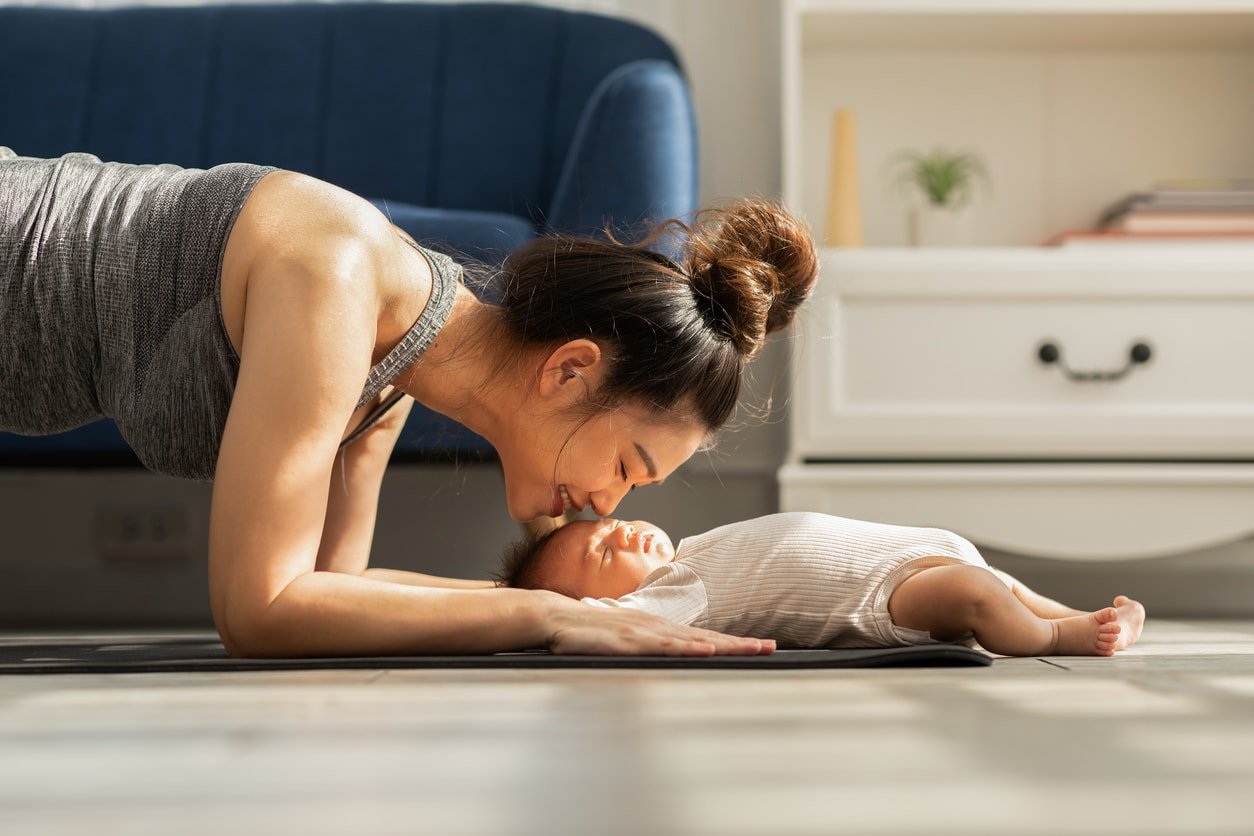
![]()

As if the newness and pressure of becoming a parent aren’t enough, many new mothers are contending with postpartum fitness myths and misinformation surrounding the experience after childbirth – which can leave them feeling inadequate.
A reality check will help you focus on what’s important. So, let’s run through some postpartum myths you should ignore. Or at least examine them a little more closely.
Postpartum Fitness Myths Every New Mother Should Ignore
Myth 1: Breastfeeding is All You Have to Do to Lose Weight
Breastfeeding has many benefits for mother and baby, and it sure burns up calories, but breastfeeding isn’t a magic bullet for losing weight. One study found that, on average, women who exclusively breastfeed for three months lost about three pounds more than women who didn’t breastfeed after giving birth.1
If you believe breastfeeding will be all it takes to lose the weight you gained during pregnancy, you’re more likely to get discouraged or feel down when that doesn’t happen. Always remember that post-pregnancy weight loss should be a slow and steady process. Now is the time to nourish your body and help it to heal. It is not the time for a restrictive diet and intense exercise.2
Oh, and FYI: If you’re not breastfeeding, that’s totally okay, too!
Myth 2: If You Were Active During Pregnancy, You Could Start Working Out Immediately
Regardless of how active and strong you stay during pregnancy, your body needs time to recover from giving birth. And if your delivery involved complications or a C-section, your recovery time may be longer than average.2
Even with an expert-designed fitness program, you should not begin exercising until you have clearance from your doctor. Be kind to yourself and remember that health and fitness are lifelong. With patience, you will get there. Returning to exercise will take time and patience – no matter how fit you were before or during your pregnancy.
Myth 3: Between the Baby and Trying to Get Enough Sleep, You Won’t Have Time to Exercise, So You Shouldn’t Bother
Yes, sleep is essential, as is self-care. But moving your body gently and within your limits can help you sleep better and manage the anxieties of being a new parent.3
Remember, exercise doesn’t have to be all or nothing. You can break the workouts into smaller chunks if you need. Any tiny bit of movement counts!4
Myth 4: Diastasis Recti Always Goes Away On Its Own
Diastasis recti (ab separation) usually starts to resolve in the first two months after childbirth – but it may not, so it’s vital to be proactive with some gentle exercises.5
Chat to your doctor about ab separation during your postpartum check-up and get them to assess where you are at. The best way to help it resolve is with exercises that engage the deep abdominals, such as deep breathing and slow, controlled movements. However, some activities, like crunches, can make it worse.5
Myth 5: Having a Baby Ruins Your Body
Women can experience severe symptoms and complications after childbirth: back pain, abdominal cramping, involuntary peeing, pain after sex, and bleeding. These problems are compounded by the fact postpartum care is hugely underserved and under-researched. The World Economic Forum acknowledges this, stating, “This lack of priority for women’s health and reproductive biology as a scientific field is systemic.” 6,7
I have read many crushing tales of new mothers whose health concerns after giving birth were dismissed. This is why initiatives like the 4th Trimester Project are essential.8
Then there are the changes to our bodies that may not cause physical pain but stay with us long after giving birth: scars, stretch marks, and the loose skin that I am all too familiar with! One of the weirdest postpartum changes I had no idea about until I spoke with friends who had given birth is that women’s feet can go up by a half or even full size after pregnancy.9
While buying new shoes may be inconvenient and expensive, does that mean your body is ruined? I say: it’s not ruined; it’s just different.
Love Your Body In Every Stage
Loving your body at all journey stages is the most critical factor in your postpartum recovery. Remember what your body has done and continues to do for you and your new baby, and be grateful for it. It’s easy to forget this when what you see in the mirror feels unrecognizable. Just because you’ve changed doesn’t mean you’re any less amazing, beautiful, and strong. Give yourself time, focus on how you feel and what your body can do, and don’t fall into the comparison trap. While your best friend may “bounce back” quickly, you may have to work harder to regain strength. I know I did.
Whatever you may have heard about what happens after you give birth and any postpartum fitness myths you might find, remember that your doctor or midwife should always be your first port of call.
Always consult your primary health provider before beginning any new exercise program, as there are some situations where exercise may not be advised. This information should be used as a guide only and should not replace the advice of your medical practitioner.
